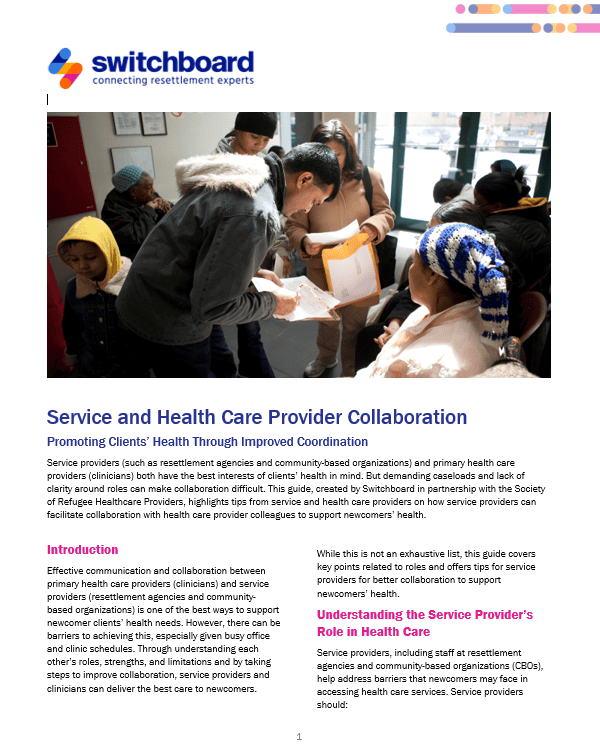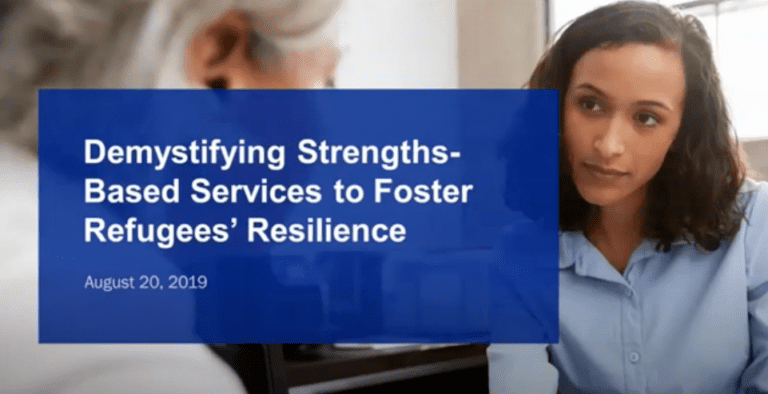Organizations in various fields have service providers who specialize in health case management. In this post, we focus on health case management specifically in the resettlement context. We describe the role of resettlement service providers acting as health case managers, as well as important limitations on their scope.
How is health case management different from other case management?
Health case management, also referred to as medical case management, is a service offered throughout a range of industries. In the health care field, medical case management may be offered at hospitals and clinics. In this context, it is usually a highly regulated position and requires a medical or clinical background.
In the resettlement context, health case management can also refer to a service provider who offers case management services related to navigation of the U.S. health care system. The service provider often does not have a clinical (medical) background but ideally has social work and/or health (such as public health) training and experience.
Health case management encompasses the services that go beyond basic, required health access services typical for an initial case management period. For example, Reception & Placement (R&P) services for refugees require referral for an initial health screening and application for public benefits such as Medicaid. These are considered core services each case should receive. Health case management goes much further than these basic services.
For some organizations, depending on funding, health case management may fall under the Office of Refugee Resettlement (ORR)’s Preferred Communities program and may also be referred to as intensive case management.
What do health case managers do?
The exact scope and job responsibilities of resettlement service providers acting as health case managers (HCMs) will depend on the program, organization, and funder requirements. For example, ORR’s Preferred Communities program details expectations for health/medical case management in their program guidelines.
An important note: Preferred Communities programming sometimes includes medical or mental health interventions provided onsite as part of health case management. ORR guidance stresses that such services must be provided by staff with appropriate medical expertise. This blog post discusses health case management that does not include medical or mental health interventions.
In general, health case management includes the following:
U.S. Health Care Education and Navigation
Health case managers explain to clients how the U.S. health care system works, going into more detail than what is offered in cultural or other introductory orientations. HCMs help clients navigate the system, including assisting in overcoming challenges and barriers that may arise.
The nature of this education and navigation can vary between clients and between organizations. With the most intensive cases, it may include physically navigating the system with clients by accompanying them to key medical appointments or by being on the phone with clients when calling the insurance company or health clinics.
Linkage to Services
Health case managers are responsible for linking clients to necessary services, whether within the health care system or a related external service. This includes helping clients find appropriate health care providers such as primary care providers and specialists, assisting clients with enrolling in health insurance (e.g., Medicaid), and connecting clients with relevant related benefits such as transportation assistance and Supplemental Security Income (SSI).
Coaching
Health case managers coach clients on how to be their own patient advocates. They also help clients build key health care navigation skills, such as how to call their insurance to request an interpreter, how to schedule their own medical appointments, and how to travel to appointments independently.
Working with Clients to Prioritize Health Concerns
Clients receiving health case management services often have many health concerns. HCMs partner with clients to help them determine which concerns to prioritize first, especially within the context of other competing demands on clients’ time, such as English classes, work schedules, and school. This prioritization should be done in partnership with the client’s medical team.
Communication Bridge
Health case managers serve a vital role as the liaison between clients, health clinics, insurance companies, the state Refugee Health Coordinator, the Social Security Administration, state Human and Health Services agencies, hospitals, health departments, and anyone else involved in the client’s care.
The role of HCMs includes helping clients establish good working relationships with their health care providers. HCMs work with clients’ medical providers to ensure that clients have access to culturally and linguistically appropriate care (for example, that the clinic uses an interpreter in the client’s preferred language) and that an appropriate plan is created to manage the client’s health conditions.
Health Education
Health case managers also provide health education and promotion for key topics to both clients and medical providers. For clients, HCMs may teach about important health topics beyond health care navigation, such as nutrition, sexual and reproductive health, or prenatal care in the U.S.
For medical providers, health case managers may provide education about refugee and newcomer populations’ unique needs. HCMs may also help set expectations with medical providers around what is and is not feasible for service providers to assist clients with while staying within the boundaries of their program, funding, and organizational capacity.
What do health case managers not do?
Lines can quickly become blurred when providing health case management for clients. It is critical that service providers recognize boundaries and limitations in their scope. As such, service providers may not:
- Act as medical or mental health professionals. In many cases, service providers offering health case management are not trained medical professionals. They are therefore legally and ethically limited in the health advice and services they can provide to clients.
- Provide health advice or diagnose a client. Health case managers cannot advise or tell clients about what health actions they should take. This is especially true when clients are deciding between different treatment options, determining whether to undergo surgery or other procedures, or addressing sensitive health matters such as contraception and abortion. HCMs also should not attempt to diagnose a client or tell a client that they have or do not have a certain illness based on the symptoms shared. Only a medical professional can diagnose a client.
- Provide medication to clients. Only licensed professionals can dispense medication. Health case managers can assist clients with accessing licensed professionals, such as an emergency room doctor, primary care clinician, or urgent care, who can prescribe or give clients appropriate medication. HCMs also should not give clients over-the-counter medication. Instead, they can assist clients with accessing a pharmacy to speak with a pharmacist about which medication is appropriate to take.
- Make health decisions for clients. Health case managers, particularly those who accompany clients to their medical appointments, must ensure they are maintaining appropriate boundaries. This means they are not involved in making any health decisions for clients, even if clients or health care providers invite them to take a more active decision-making role. In this situation, HCMs must redirect any conversations to be between the client and health care provider. HCMs should also maintain and respect clients’ right to privacy during health appointments.
Conclusion
Providing health case management is an integral part of serving refugees’ and other newcomers’ needs. For additional resources, download Switchboard’s “Introduction to Refugee Health” guide.










